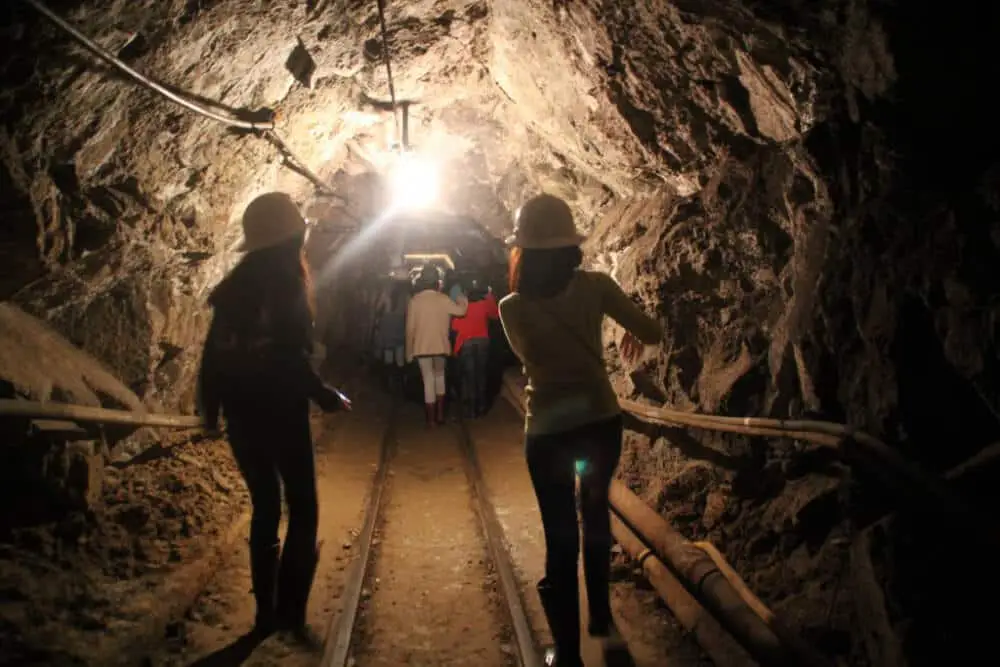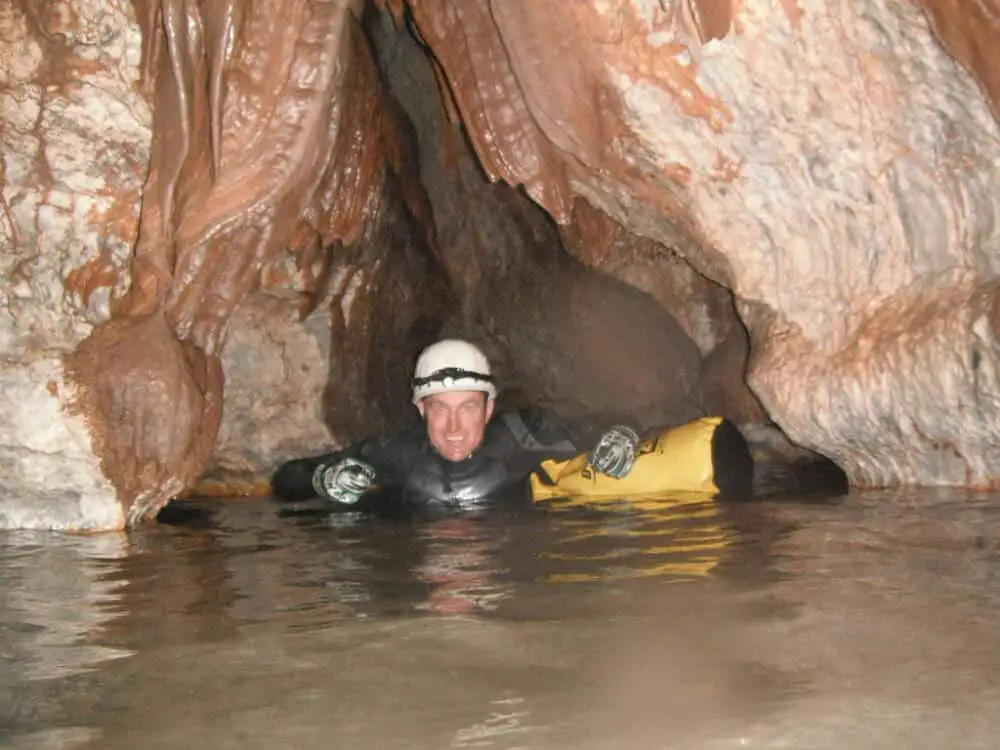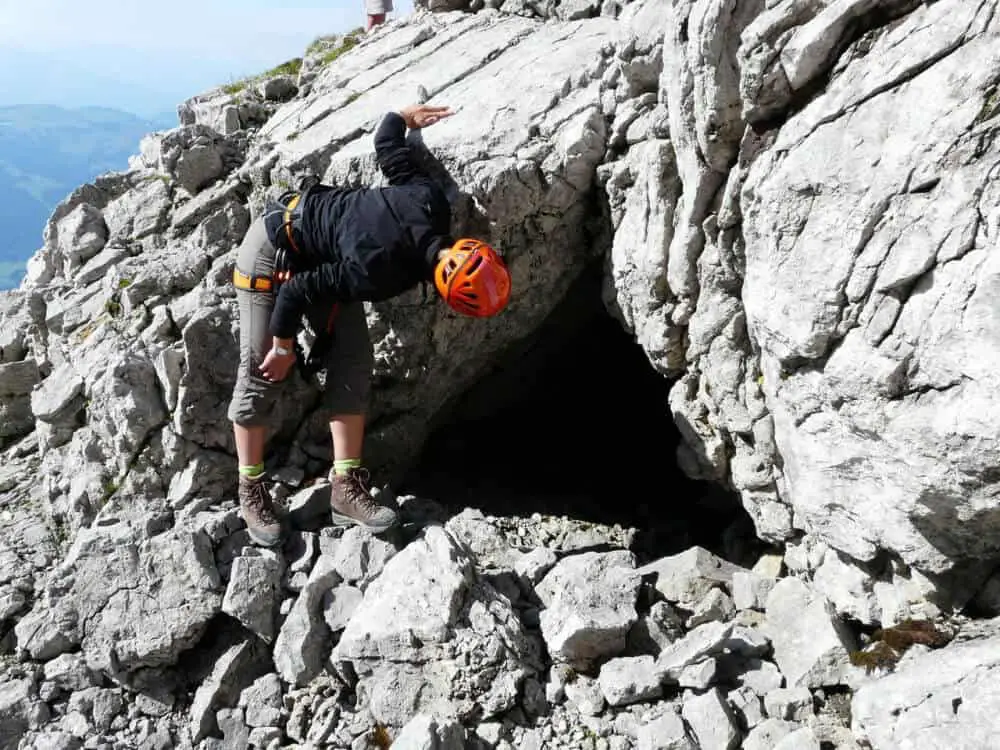Should you use spelunking or caving? You’re in the right place: I want to know as well. In this article, we get into the meaning and origin of both words.
If you don’t want to read the entire thing, that’s fine. Bottom line is:
Should you use caving or spelunking? You should use caving. Caving is widely used and has a positive connotation. Caving and spelunking both mean the recreational exploration of caves. There’s no difference in definition. But there is a historical difference in connotation. Professionals call themselves cavers, and refer to amateurs as spelunkers.
So why does the word spelunking even exist – or is it just there to secretly separate the true cavers from the bad?
Why You Should Use Caving
I’m just getting into caving, and there’s something bothering me that has probably bothered all fresh cave explorers. What is this sport called? How unfortunate that it ended up with two names. Some people call it spelunking, some call it caving. It’s quite confusing.
Why is caving the better option? Does it actually matter how you call it? Or does no one care? Let’s find out.
To be a pro, you should definitely call yourself a caver (and also learn the skills of course).
The reason is that caving is the official name for the international sport. It’s more widespread in use than spelunking. They’ll understand you in the UK, Holland (where there are, of course, lots of caves), Spain.
Also, spelunking has a bit of a bad taste to it. The reason is that spelunking used to mean amateur-caving. Nowadays this isn’t the case, but the negative association is still there. It’s funny though that of all places, in Germany you actually should use spelunking. Perhaps it tells us something about their capabilities.
It’s also more used in the US in general. Probably because it was invented there.
Alright, I want to know where these words come from. Let’s dive right in.
Where Does the Word Caving Come From?
Caving is rather straightforward I presume. Caving is the word for cave exploring. It’s the recreational exploration of caves. A caver is someone who explores caves as a sport. Both simply come from the word cave (obviously). I won’t pretend it’s more complicated than it is. Let’s leave it at that and move on.
Where Does the Word Spelunking Come From?
If you want to make enemies, call any experienced caver a spelunker (or even better: flashlight caver). I’m told that professional caving circles (I’m not there yet) call amateur explorers spelunker – someone who is unknowledgeable. A spelunker is somewhat lesser than a caver. If you want to impress other cavers, start by calling yourself and others a caver.
But more importantly, get knowledgable, because you won’t fool the experts.
To understand where the term spelunking comes from, we need to dive into history a bit.

What Does Speleology Mean?
Speleology is the scientific study of caves. This word was passed onto English through French. The first official use of this word was in 1885 when Edouard Martel founded the Société de Spéléologie (Speleological society). A scientist who studies caves is called a speleologist.
Both words are derived from the Latin spelaeum, which means cave, den, cavern, or grotto. If we go back even further, it is derived from the Greek spelaion, meaning cave. When Martel first used these terms, it didn’t necessarily mean the scientific or professional exploration of caves: it also included recreational exploration.
Want to know what it takes to become a speleologist? If so, I’ve written the perfect guide for you: check out the article here.
So why are cavers sometimes called spelunkers?
The word spelunk comes from Middle English, meaning cave. It’s derived from the Latin spelunca, or the Greek spelynx, which also means cave.
A similar word is used in Dutch (spelonk), meaning a ‘cavity in a mountain’, and German (Spelunke). In German, the use has changed to ‘a scruffy bar or pub’.
To summarize: everything is derived from classic words meaning cave.
So Which Should I Use?
Alright, enough linguistics. How to know which one to use?
The confusion started when American author Clay Perry used this the word spelunker when writing about a (fictional) group of explorers. In his book, the group of men in New England referred to their caving club as ‘spelunkers’.
With his writing, he created a new name for the game. Throughout the 40s and 50s, people going into caves inside the US were called spelunkers. By this I mean everybody, no matter how experienced or prepared they were.
In the UK however, people going into caves were called ‘potholers’.
Everyone else still simply called it caving.
So spelunking was more fashionable in the US around the 1940s. End of story? Not really, there’s more to it.
Cavers rescue spelunkers
The words had a different connotation throughout the last century. In the 1960s, a campaign started to change the connotation of the word spelunker.
More experienced cavers wanted to distance themselves from a large number of amateurs. They started to call inexperienced cavers ‘spelunkers’. These were people that used inappropriate gear (for example regular climbing gear), don’t have the right training, and generally don’t know a lot about caves.
In this way, experienced cavers moved away from the word spelunker. And they used clever taglines to state their opinion on the matter. A famous bumper sticker says:
“Cavers rescue spelunkers”
… which really says it all, I think.

Spelunking means more …
Nowadays, ‘spelunking’ is the derogatory term for unprepared caving trips. It’s right up there with ‘flashlight caver’. It doesn’t end there, though. Spelunking also has some other, rather questionable denotations. Spelunking is now used as sexual slang. I’ll try and keep it decent. It means the act of exploring for the missing condom after intercourse.
‘Spelunk’ is also the sound a clumsy caver makes when he slips and falls, and lands in water – or so the caving joke goes.
So Should I Call Myself a Spelunker or a Caver?
The term spelunker isn’t all bad: it isn’t as unflattering as it used to be. It simply means you’re more a hobbyist than a competitive caver. However, it can be a grave insult when calling a caver a spelunker. Believe me, I’ve made this mistake and will never make it again.
A spelunker is an untrained, inexperienced caver, who sees caving as a hobby. He or she enjoys the wonders of the underground world, without overthinking or overdoing it.
A caver is someone who is knowledgable, uses the right equipment, and is prepared. Cavers go deeper, they want to explore new cave networks, and push the envelope.
In the UK however, the whole ‘spelunking-hype’ didn’t really happen. So if you’re from the UK and want to be safe, don’t use the word spelunking: simply call it caving, since that’s what it’s called over there. You can also go with potholing if you’d like to be a potholer. Especially in Yorkshire, there are a lot more potholers than cavers.
What about other countries?
In non-English-speaking countries, such as France or Spain, caving really won’t mean anything to them. But speleo, from the Latin root, does. So they will understand when you tell them ‘you speleo’. In Germanic countries, however, both caving and speleo won’t do the trick. You’ll need to use ‘Höhlenforscher’ – literally meaning researcher of holes – which is the secret word there.
I guess it’s quite obvious that if you take caving in the least amount serious, you should definitely call yourself a caver, and not a spelunker. All things considered, calling yourself and others ‘cavers’ is probably your best bet in nearly all situations.
But make sure you have the knowledge and equipment required to call yourself a true caver since it isn’t in the name but in the action.
Related Question
What is the difference between caving and spelunking? The main difference between the two words is their origin, and later their connotation. The term spelunking gained popularity in the 20th century in the US among hobbyists. More skilled cavers nowadays call amateur cavers ‘spelunkers’. There is no real difference in activity; they both refer to ‘cave exploration’.
What is the difference between caving and potholing? Potholing is a certain discipline within caving. The aim of potholing is descending and ascending ropes in vertical caves, also called ‘potholes’. Caving refers to the activity of cave exploration as a whole, including potholing. Potholing is sometimes also called ‘vertical caving’. In the UK, ‘potholing’ is sometimes used instead of ‘caving’.
What do you call a person who explores caves? It depends on the intention of the explorer. Recreational cave explorers are mostly referred to as ‘spelunkers’ or ‘cavers’ (although ‘caving’ is increasingly popular – spelunking is still widely used in the US). A scientific cave explorer is called a speleologist.

